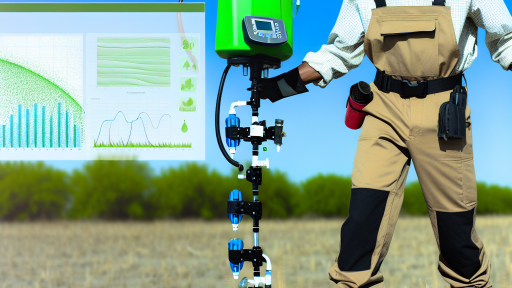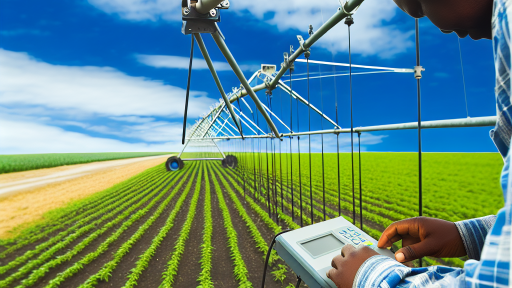Introduction to Sustainable Agriculture and Its Economic Implications
Sustainable agriculture promotes practices that enhance environmental health.
It increases the efficiency of resource use in farming.
Farmers adopting sustainable approaches often see lower operating costs.
Moreover, this transition can lead to higher crop yields over time.
Economically, sustainable agriculture offers a pathway to reduce dependency on costly inputs.
For instance, it encourages the use of organic fertilizers and pest control methods.
As a result, farmers can cut down on their chemical purchases.
In addition, sustainable practices can increase soil fertility and resilience.
This resilience helps farms withstand adverse weather conditions more effectively.
Consequently, farms facing fewer crop failures enjoy more stable incomes.
In terms of market trends, consumers increasingly prefer sustainably produced goods.
This demand creates new opportunities for farmers to sell their products at premium prices.
Local markets for organic and sustainably sourced products are growing rapidly.
Farmers who adapt quickly can capitalize on these emerging trends.
Furthermore, sustainable agriculture can improve community health and wellbeing.
Transform Your Agribusiness
Unlock your farm's potential with expert advice tailored to your needs. Get actionable steps that drive real results.
Get StartedBy offering pesticide-free food, it promotes a healthier population.
This approach also fosters a more connected community that supports local economies.
Investing in sustainable practices enhances a farm’s long-term viability.
The economic advantages of transitioning to sustainable agriculture are clear.
This strategy benefits farmers economically and positively impacts society.
Cost Savings Through Reduced Input Use in Sustainable Farming Practices
Lower Chemical Input Costs
Transitioning to sustainable agriculture significantly reduces chemical input costs.
Farmers can minimize their reliance on synthetic fertilizers and pesticides.
In turn, this leads to savings on purchasing and application expenses.
Moreover, organic fertilizers often improve soil health over time.
This enhanced fertility can decrease future input needs.
Efficient Resource Utilization
Sustainable farming techniques promote efficient use of resources.
Practices such as crop rotation and cover cropping enhance soil structure.
As a result, these methods reduce erosion and boost water retention.
Farmers spend less on irrigation and soil restoration efforts.
Consequently, this efficiency contributes to overall cost savings.
Reduced Labor Costs
Implementing sustainable practices can lead to lower labor costs.
For instance, integrated pest management reduces the need for extensive pest control measures.
Additionally, automated systems can assist in organic farming tasks.
These innovations streamline operations and improve productivity.
Over time, farmers notice significant labor cost reductions.
Enhanced Market Opportunities
Adopting sustainable practices opens up new market opportunities.
A growing consumer preference for organic and eco-friendly products exists.
Farmers can command premium prices for sustainably-produced goods.
Moreover, this shift boosts farm profitability in competitive markets.
Showcase Your Farming Business
Publish your professional farming services profile on our blog for a one-time fee of $200 and reach a dedicated audience of farmers and agribusiness owners.
Publish Your ProfileParticipating in sustainability initiatives can also attract investors.
Long-term Financial Benefits
Sustainable agriculture offers substantial long-term financial benefits.
Investing in soil health leads to improved crop yields over time.
This resilience helps farmers withstand market volatility.
Moreover, it creates a more stable income stream year after year.
Consequently, sustainable practices build financial security for farmers.
Increased Market Demand for Organic and Sustainably Produced Goods
Rising Consumer Awareness
Consumers are increasingly aware of health and environmental issues.
This awareness drives a growing preference for organic products.
Many shoppers seek out sustainably produced goods in their purchases.
Shifts in Purchasing Behavior
There has been a noticeable shift in purchasing behavior among consumers.
More people prioritize buying organic over conventionally produced items.
As a result, retailers are expanding their organic product selections.
Market Growth Potential
The market for organic products is rapidly expanding worldwide.
In fact, reports indicate consistent year-over-year growth in this sector.
Businesses investing in sustainable practices can tap into this lucrative market.
Consumer Trust and Brand Loyalty
Adopting sustainable practices enhances brand trust among consumers.
Companies that commit to ethical practices often gain loyal customers.
Ultimately, consumer loyalty translates into increased sales and profits.
Government and Institutional Support
Government initiatives are promoting sustainable agriculture practices.
These programs often provide funding and grants to farmers.
Moreover, institutions support organic farming through educational resources.
Long-Term Economic Benefits
Transitioning to sustainable agriculture yields long-term economic benefits.
It reduces costs related to chemical inputs and soil degradation.
Furthermore, it promotes resilience against climate change impacts.
Learn More: Sustainable Farming: Reducing Water Usage Effectively
Long-term Financial Benefits of Soil Health and Biodiversity Enhancement
Enhancing Soil Health
Transitioning to sustainable agriculture significantly improves soil health.
Healthy soil retains moisture better than degraded soil.
This moisture retention lowers irrigation costs for farmers.
Additionally, enriched soil supports higher crop yields over time.
Farmers can thus enjoy increased productivity and profitability.
Promoting Biodiversity
Biodiversity boosts ecosystem services essential for agriculture.
Diverse ecosystems lead to healthier crops that resist pests naturally.
This reduces the need for chemical pesticides and fertilizers.
Consequently, farmers see a decrease in input costs.
Increased biodiversity also contributes to pollination efficiency.
Improving Resilience
Healthy soils and biodiversity improve farm resilience.
They help mitigate the effects of climate change and extreme weather.
This adaptability reduces the risk of crop failures.
As a result, farmers secure stable income streams.
Long-term Financial Gains
Investing in sustainable practices leads to long-term financial benefits.
Showcase Your Farming Business
Publish your professional farming services profile on our blog for a one-time fee of $200 and reach a dedicated audience of farmers and agribusiness owners.
Publish Your ProfileHealthy soils sustain productivity over many growing seasons.
Farmers benefit from lower costs and higher outputs cumulatively.
Additionally, there is a growing market demand for sustainably produced goods.
Hence, transitioning can lead to higher prices for products.
Access to Financial Support
Many organizations offer financial incentives for sustainable practices.
Farmers can access grants and subsidies for transitioning efforts.
Such financial support eases the initial investment burden.
In the long run, these funds can significantly increase overall profitability.
You Might Also Like: Sustainable Farming Practices for Climate Resilience
Economic Resilience: How Sustainable Agriculture Mitigates Climate Risks
Understanding Climate Risks
Climate change poses significant risks to agriculture.
These risks include extreme weather events and shifting growing seasons.
Farmers face challenges in maintaining yields and income stability.
Benefits of Sustainable Practices
Sustainable agriculture enhances soil health and biodiversity.
This approach increases resilience to climate variations.
Farmers practicing sustainable methods can reduce costs over time.
Crop Diversification
Diversifying crops protects farmers from market volatility.
Different crops can thrive under varying climate conditions.
This strategy spreads financial risk across multiple products.
Improved Resource Efficiency
Sustainable agriculture promotes efficient use of water and nutrients.
Implementing conservation practices lowers input costs.
Farmers can enhance productivity while minimizing environmental impact.
Long-term Economic Stability
Healthy ecosystems contribute to sustained agricultural productivity.
Sustainable practices foster community well-being and economic growth.
Investing in sustainable agriculture supports future generations.
Access to New Markets
Consumers increasingly prefer sustainably sourced products.
Farmers can capitalize on this demand by adopting green practices.
Accessing niche markets can lead to higher profit margins.
Government Support and Incentives
Many governments offer incentives for sustainable practices.
Farmers can benefit from grants and subsidy programs.
Such support encourages the transition to sustainable agriculture.
Find Out More: Carbon Sequestration Strategies for Sustainable Farms

Job Creation in Green Technologies and Sustainable Farming Sectors
Employment Opportunities in Sustainable Agriculture
Sustainable agriculture creates numerous job opportunities in local communities.
These jobs range from farm management to agronomy.
Farmers transition to organic and sustainable practices, increasing workforce demands.
Many new positions require expertise in sustainable farming techniques.
Additionally, educational institutions offer programs to prepare workers for these roles.
Growth of Green Technology Industries
Transitioning to sustainable agriculture fuels growth in green technologies.
Businesses investing in renewable energy technologies boost job creation.
Companies like BioGreen Technologies lead in developing eco-friendly farming equipment.
These advancements streamline processes and enhance productivity.
Showcase Your Farming Business
Publish your professional farming services profile on our blog for a one-time fee of $200 and reach a dedicated audience of farmers and agribusiness owners.
Publish Your ProfileMoreover, research and development in green tech create specialized roles.
Local Economic Impact
Sustainable agriculture positively impacts local economies.
It encourages the establishment of local supply chains, creating more business opportunities.
Farmers often cull from local resources, benefiting nearby service providers.
As a result, communities experience increased resilience against economic downturns.
This interconnectedness fosters job creation across various sectors.
Support and Incentives for Job Creation
Governments promote job creation through incentives for sustainable practices.
Subsidies and grants encourage farmers to adopt eco-friendly technologies.
At the same time, local authorities provide support for sustainable businesses.
These initiatives bolster job retention and growth in the region.
Furthermore, collaborations between private and public sectors enhance overall impact.
Delve into the Subject: Climate-Smart Soil Management Techniques Explained
Access to Government Incentives and Subsidies for Sustainable Practices
Understanding Incentives
Government incentives encourage farmers to adopt sustainable agriculture practices.
These incentives can come in various forms, including direct subsidies, grants, and tax breaks.
Essentially, they reduce the financial burden associated with transitioning to sustainable methods.
Types of Available Subsidies
Several types of subsidies cater to sustainable agriculture.
- Direct financial aid helps cover the costs of organic certification.
- Grant programs support research and development initiatives.
- Tax incentives encourage investments in eco-friendly technologies.
Examples of Government Programs
Many regions have specific programs designed to promote sustainability.
The Environmental Quality Incentives Program (EQIP) offers financial assistance for sustainable practices.
Additionally, the Conservation Stewardship Program (CSP) rewards farmers for maintaining conservation activities.
Local governments often provide tailored initiatives suitable for community needs.
Benefits of Utilizing Assistance
Accessing government incentives leads to substantial financial savings.
These savings empower farmers to invest more in sustainable practices.
Consequently, they can improve their long-term productivity and profitability.
Application Process for Subsidies
The application process for government incentives involves specific steps.
Farmers must typically demonstrate their commitment to sustainable practices.
Furthermore, staying updated on changing regulations is crucial for eligibility.
Moreover, consultations with local agricultural extension offices can provide valuable guidance.
Networking Opportunities
Engaging with government programs creates networking opportunities for farmers.
Farmers can connect with experts in sustainable agriculture through these initiatives.
Additionally, they can interact with other farmers sharing similar goals.
Such connections can lead to collaborative efforts and shared resources.
Comparative Analysis of Yields
Sustainable Agriculture Practices
Sustainable agriculture emphasizes ecological practices.
These methods prioritize crop rotation and organic fertilizers.
As a result, soil health improves noticeably over time.
Moreover, this approach enhances biodiversity on farms.
Farmers also utilize integrated pest management to reduce chemical use.
Consequently, yields can stabilize or even increase sustainably.
Conventional Agriculture Methods
Conventional farming relies heavily on monoculture systems.
This often leads to soil depletion and increased pest susceptibility.
Additionally, high levels of synthetic fertilizers are utilized.
Showcase Your Farming Business
Publish your professional farming services profile on our blog for a one-time fee of $200 and reach a dedicated audience of farmers and agribusiness owners.
Publish Your ProfileSuch practices can boost short-term yields but harm long-term sustainability.
Moreover, chemical inputs can lead to waterway pollution.
This pollution adversely affects aquatic ecosystems and drinking water sources.
Yield Comparisons
Research indicates varying yield outcomes between these methods.
Many studies show sustainable practices can match conventional yields.
For instance, a recent study by GreenEarth Farming revealed comparable results.
In certain scenarios, sustainable systems outperformed traditional approaches.
Farmers adopting cover crops reported higher yields in the following season.
Furthermore, sustainable methods can lead to reduced production costs.
Long-term Economic Benefits
Sustainable agriculture fosters resilience against market fluctuations.
Lower input costs enhance profitability over time.
Additionally, sustainable practices improve crop diversity.
This diversity reduces the risk of total crop failure.
Long-term soil health also translates to consistent productivity.
Ultimately, these benefits support local economies significantly.
Additional Resources
Saving Money, Time and Soil: The Economics of No-Till Farming …
Chapter 5 : Food Security — Special Report on Climate Change and …




